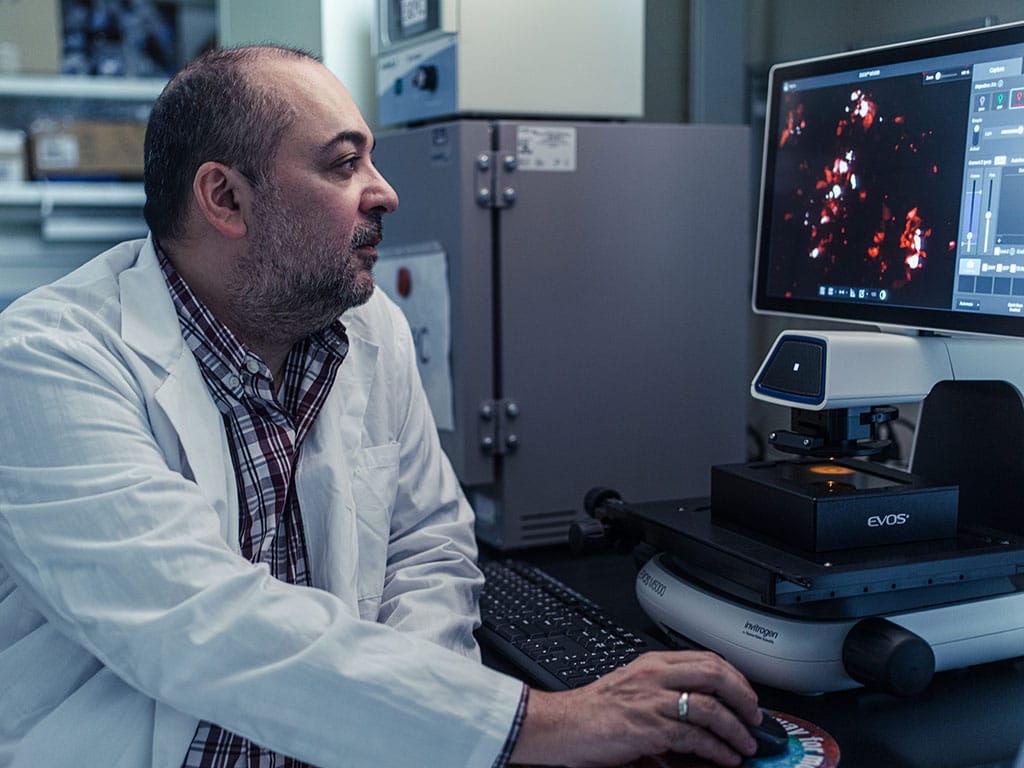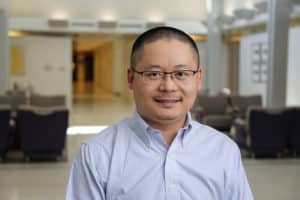Researchers at Texas Biomed have received approval to work with a weakened, non-harmful version of SARS-CoV-2 in biosafety level 2 (BSL-2) laboratories, which makes it safer, faster and easier to study the virus, its mutations, and to identify new treatments for COVID-19.
SAN ANTONIO (July 20, 2022) – As part of ongoing efforts to make a live attenuated vaccine for COVID-19, Texas Biomedical Research Institute Professor Luis Martinez-Sobrido and his team developed a weakened, or attenuated, version of SARS-CoV-2 that does not cause illness nor death. Texas Biomed has now received approval from the National Institutes of Health Office of Science Policy (NIH-OSP) to work with the attenuated virus in its biosafety level (BSL-2) laboratories. Previously, SARS-CoV-2 could only be safely studied in a biosafety level 3 (BSL-3) laboratory, which is much more restrictive, requires more personal protective equipment, and extensive training.
Biosafety levels are ranked 1 to 4, with one being the lowest and 4 being the highest. The levels define the required safety equipment and protocols based on how pathogens are spread and what treatments are available.

“As far as we are aware, we are the first in the nation to receive approval to work with this weakened version of the virus in BSL-2,” says Dr. Martinez-Sobrido. “This makes it safer for our researchers to work with the virus and will help us work faster to find antivirals and other treatments for COVID-19, as well as continue working to use this weakened virus as a live attenuated vaccine candidate.”
A live attenuated vaccine relies on a weakened version of the virus to stimulate the body’s immune system and create antibodies and cell responses against the virus. Live attenuated vaccines are used for influenza, smallpox, chickenpox, yellow fever, and measles, mumps and rubella.
Dr. Martinez-Sobrido and his team made an attenuated SARS-CoV-2 strain that is missing two chunks of its genetic code that would normally make two proteins, using reverse genetics approaches they developed. The virus is still able to survive, but has a very hard time replicating and does not cause serious illness. In two rodent models, golden Syrian hamsters and transgenic mice, the original strain of SARS-CoV-2 would have caused deadly weight loss, but this weakened version does not cause severe weight loss nor death. The attenuated virus was carefully designed and extensively tested, showing it is nearly impossible to evolve and revert back to its original form.
“Our studies show that cutting out these two proteins have essentially crippled the virus so it is still alive, but no longer a threat,” says Texas Biomed Staff Scientist and paper first author Chengjin Ye, PhD. “This is why we can now safely work with it in the BSL-2 laboratories.”

The team plans to use the attenuated virus for further studying the pathogen, developing vaccines and for screening antiviral drugs as part of its collaboration with multiple NIH Antiviral Drug Discovery (AViDD) Centers for Pathogens of Pandemic Concern. For this, the researchers are currently developing fluorescent forms of the attenuated virus to use in the BSL-2 to investigate large, complex libraries of compounds to identify those that affect the virus.
“We and our collaborators can now safely and easily do high-throughput screening of thousands of compounds in the BSL-2, and when we narrow down to a handful of the most promising candidates, then we can test those against the real virus in the BSL-3,” Dr. Martinez-Sobrido says. “This will help accelerate the drug discovery process.”
Texas Biomed underwent review both internally and externally, before receiving approval to work on the attenuated SARS-CoV-2 in the BSL-2.
“After several rounds of intense Institutional Biosafety Committee reviews, we are convinced that research with attenuated SARS-CoV-2 generated by Dr. Martinez-Sobrido’s lab can be safely conducted in BSL-2,” says Anthony Wang, PhD, director of environmental health and safety at Texas Biomed. “To ensure everyone’s safety, NIH-OSP carefully scrutinizes all requests for Biosafety Level reduction. The rapid turnaround from NIH-OSP in granting the request is a demonstration of the close collaboration between researchers, safety professionals and regulatory entities at Texas Biomed.”
For labs interested in working with the recombinant virus, please begin requests here. Please note that BSL-3 is required, unless granted separate authorization from NIH-OSP to use in BSL-2.
Study collaborators:
Texas Biomed: Jun-Gyu Park, Kevin Chiem, Anna Allué-Guardia, Andreu Garcia-Vilanova, Jordi B. Torrelles
Research Institute at Nationwide Children’s Hospital: Piyush Dravid, Amit Kappor
University of Alabama at Birmingham: Mark R. Walter, James J. Kobie
Center for Translational Antiviral Research at Georgia State University: Richard K. Plemper
Funding information:
This research was partially supported by grants W81XWH2110103, W81XWH2110095, and W81XWH2210283 from the Department of Defense (DoD) Peer Reviewed Medical Research Program (PRMRP); 1R43AI165089-01, 1R01AI161363-01 and 1R01AI161175-01A1 from the National Institute of Health (NIH); by the Center for Research on Influenza Pathogenesis and Transmission (CRIPT), one of the National Institute of Allergy and Infectious Diseases (NIAID) funded Centers of Excellence for Influenza Research and Response (CEIRR; contract # 75N93021C00014); the San Antonio Partnership for Precision Therapeutics, the San Antonio Medical Foundation, the Bill & Melinda Gates Foundation (BMGF), and the NIH Antiviral Drug Discovery (AViDD) Centers for Pathogens of Pandemic Concern.
Patent information:
Dr. Ye and Dr. Martinez-Sobrido are co-inventors on a patent application for the reverse genetics approaches to generate recombinant SARS-CoV-2, including attenuated forms for use as live-attenuated COVID-19 vaccines.
###
ABOUT TEXAS BIOMED
Texas Biomed is one of the world’s leading independent biomedical research institutions dedicated to eradicating infection and advancing health worldwide through innovative biomedical research. Texas Biomed partners with researchers and institutions around the world to develop vaccines and therapeutics against viral pathogens causing AIDS, hepatitis, hemorrhagic fever, tuberculosis and parasitic diseases responsible for malaria and schistosomiasis disease. The Institute has programs in host-pathogen interactions, disease intervention and prevention, and population health to understand the links between infectious diseases and other diseases such as aging, cardiovascular disease, diabetes and obesity. For more information on Texas Biomed, go to www.TxBiomed.org.